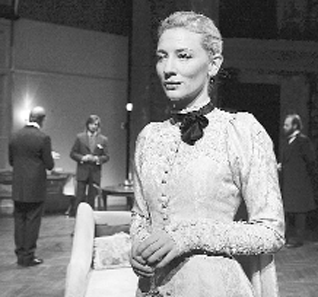Oppressed girls grow up to be nastier women than creators intended
Crazy ladies trapped in big houses are the emergent theme this year. Since the sublime “Grey Gardens,” we have been treated to the movie star Cate Blanchett in a new production of “Hedda Gabler” and one-time sitcom star Phylicia Rashad in a musical based on Lorca’s sexualized allegory, “The House of Bernarda Alba.” While both of the latter pieces are showy and earnest, they never approach the honesty and artistry of the former and, quite frankly, make for two dull evenings in the theater.
When I heard that “Bernarda Alba” was a musical, I thought it so far-fetched I immediately imagined something satirical, along the lines of “The Mantilla Game.” Lorca’s story of sexually frustrated women trapped into seven years of mourning by their mother is a masterpiece that doesn’t cry out to be a musical. The poetry of the original and its metaphor for the repressive fascism Lorca struggled against stand on their own, and is frighteningly relevant in a time of irrational, defensive, and fear-based governance. Making it a musical demands amping up the intensity, suffocation, and oppression that can only end in tragedy. Michael John LaChiusa’s showy, but ultimately superficial score undermines the passion and intensity of the original and becomes a series of disjointed set pieces. To shoehorn in songs and keep the show at 90 minutes, LaChiusa and director Graciela Daniele have removed Lorca’s lyricism and added nothing of any consequence.
After the riveting power of LaChiusa’s “See What I Wanna See,” earlier this year, the tedium of “Bernada Alba” is even more disappointing. (I counted nine people walking out of the performance I attended.) Daniele has directed the show with lots of visual creativity but no dramatic support. For every wonderful use of rhythm, fans, postures, and intriguing juxtaposition of the straight-back chairs that are the primary set element, there is a dearth of developed and believable characters. Where we should feel growing tension as the girls compete among themselves and for the affections of the unseen Pepe el Romano, the outside force who will save one of them from the oppression of Bernarda’s house and tightening of control, we get “Mean Girls” in mourning, or the kind of spat more often seen among the sisters in “The Brady Bunch.” Neither LaChiusa nor Daniele appears to have done anything but strike postures and hope that the audience will ascribe gravitas to the undertakings. If what they want is for the audience to feel the oppression of Bernarda’s house, they have managed to do that, but only by boring us to death.
Phylicia Rashad doesn’t help things with her mannered and disconnected performance in the title role. She intones instead of acting. At times, when she bestrides a chair and acts masculine, she is simply laughable. The suppressed fury, the lashing out and desperation that speaks more to loss of power than confidence in control that is the core of this character is nowhere to be seen in Rashad’s shallow interpretation. The whole cast is so at sea that there is neither heart nor soul in the work. Candy Buckley as the maid Poncia, for instance, plays the role of the sexually liberated servant as if she were Captain Hook in a girls’ school production of “Peter Pan.” Only Judith Blazer in the relatively small role of Magdalena seems honestly present and in control. Her sensitive presence—Magdalena is the middle daughter—shows what balance and honesty might have been possible with this show had the creators honored the source material over their own egos and theatrics.
Like the gals at Bernarda’s, Hedda Gabler is also trapped by an oppressive culture. She becomes a classic depressive who acts out tragically. Ibsen was heavily influenced by Freud and struggled against the conservatism of the theater of his time, bringing fresh ideas and characters to the stage in which motivation, complexity of character, and subtlety redefined realism. As a result, we get Hedda—tormented, unhappy, and struggling to fit into a structure that doesn’t fit her and a society that stifles women, particularly women of her character. Hedda was raised to be a free spirit by a legendary general and does not slip easily into the subservient female role when she marries Tesman, especially when she has enough common sense not to marry the alcoholic Lovborg, for whom she harbors an enduring passion. But to put it simply, she ain’t happy about the whole mess.
This is a play rich in subtext and interpersonal dynamics, but in the new adaptation by Andrew Upton and the current production starring Cate Blanchett in the title role directed by Robyn Nevin, the play suffers mightily. While Blanchett can command the stage and is astonishing to look at, her Hedda is petulant, bitchy, just plain mean. Not only does the performance not make sense, Blanchett has been given nowhere to go, playing the character’s extreme frustration from the beginning. Her journey is over before it begins, and we just see a nasty woman.
If Ibsen does anything with this play, it’s to show the slow unraveling and increasing pressure Hedda ultimately can’t deal with. Upton and Nevin have undermined the key argument in the play—the very Freudian conflict between romance and reality—and give us nowhere to go. The tragedy of Hedda is ultimately her insignificance compared to the social order, her understanding of that, and her suicide, all encapsulated in Ibsen’s original last line, stripped from this production like so much else—“Good God, people don’t do such things.”
gaycitynews.com


































